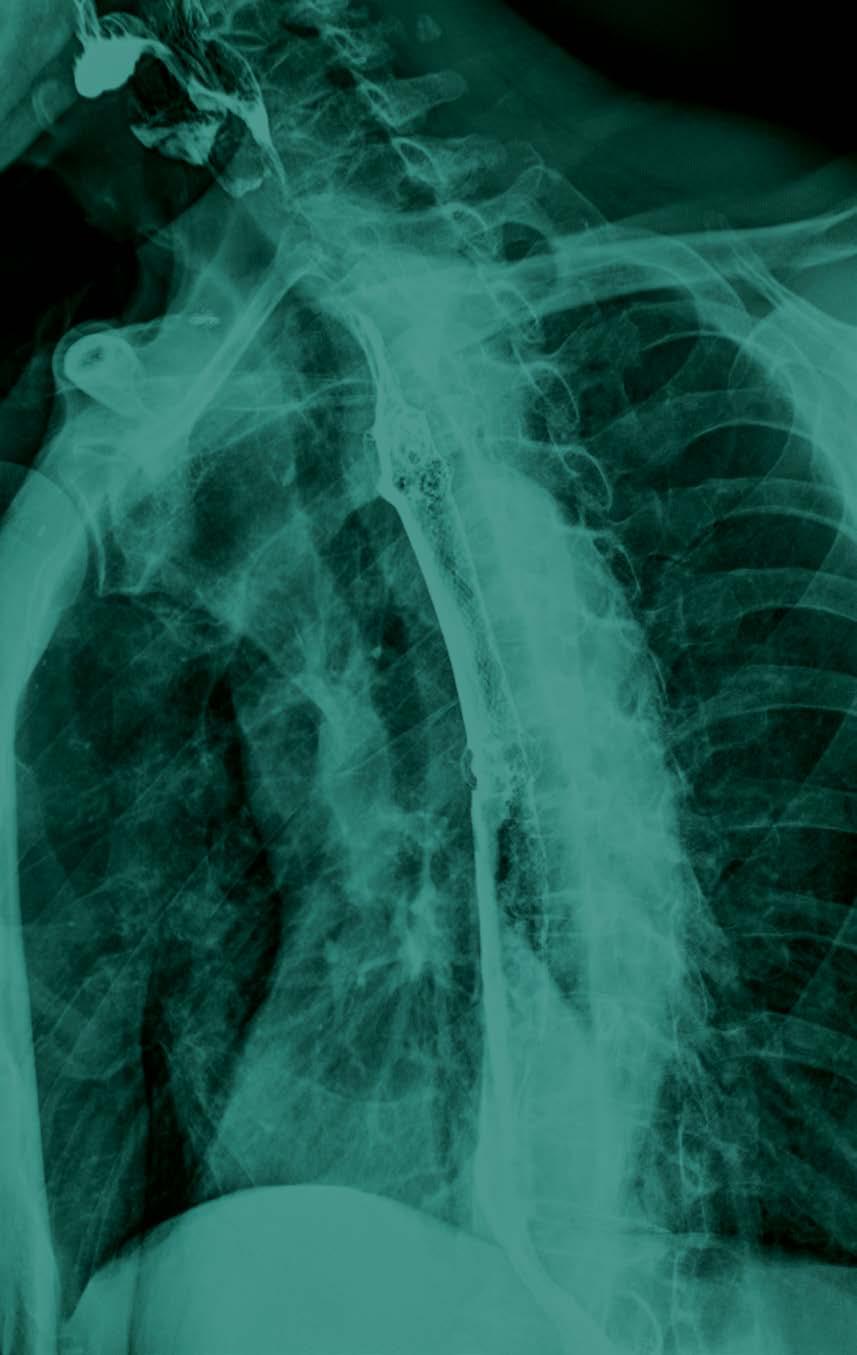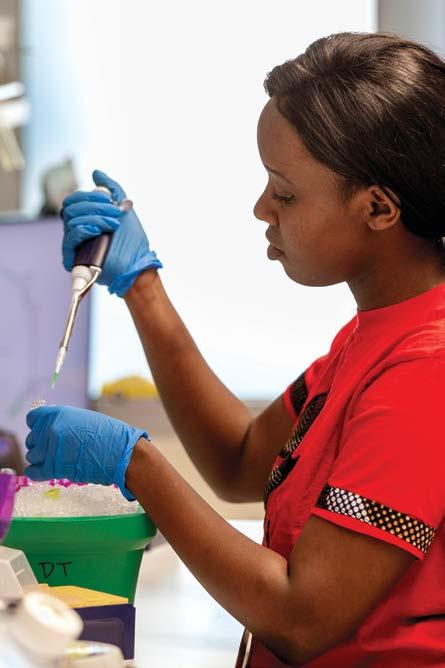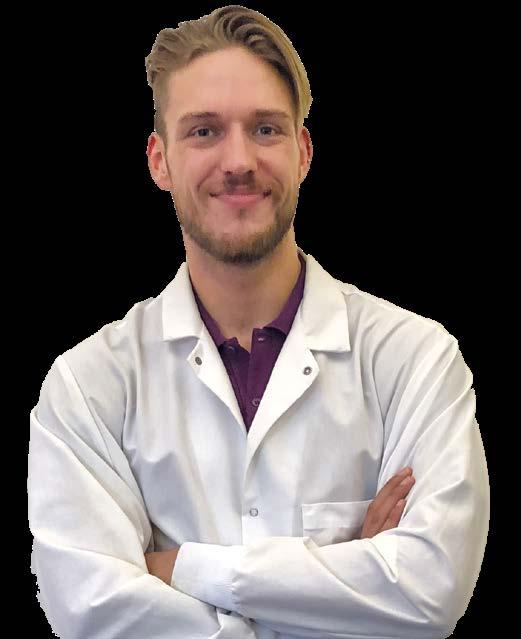

BIOMEDICAL ENGINEERING
MASTER’S & DOCTORAL PROGRAMS
GRADUATE PROGRAMS
As a student in our highly competitive graduate programs, you will innovate at the intersection of engineering, technology, and medicine. Engage in research leading to new approaches and technologies to promote and enhance human health, collaborating on multidisiciplinary teams from across NYU. Focus on solving real-world problems in areas such as biomedical imaging, robotics and prosthetics, and systems genetics.
MS IN BIOMEDICAL ENGINEERING
In our flexible one-year or two-year program, you will build a strong foundation through core courses in human anatomy and physiology, applied math, biomechanics, and biomedical instrumentation. Tailor your studies to your career goals with a choice of specialized courses in areas such as medical imaging and image processing, tissue engineering and repair, biomedical devices and data, and rehabilitation/disability engineering. Engage in experiential learning by collaborating with biomedical researchers and clinicians on independent study and research projects, creating solutions that fill important clinical needs.
PHD IN BIOMEDICAL ENGINEERING
Develop your expertise in an integrated, dynamic environment among the most accomplished authorities in the field. PhD mentors are drawn from the schools of engineering and medicine, providing you with a broad perspective and diversity of knowledge. Acquire all of the necessary skills to develop technological innovations that contribute to improved human health and quality of life. You will have a multitude of opportunities to become immersed in advanced research and work in clinical environments.
MS IN BIOINFORMATICS
This online program takes a deep dive into bioinformatics, a highly interdisciplinary field that combines biology, data and computer science, and statistics to analyze and interpret biomedical data. You will develop special skills to manage and study next-generation sequencing technology, and apply your expertise to a wide range of areas, such as infectious diseases (e.g., COVID-19), genetic diseases (e.g., cancer), public health (e.g., diabetes), and more.

STUDENT SPOTLIGHT
NIKITA GRIGORYEV
Biomedical Engineering, PhD
Collaborating with Professor Kalle Levon, Nikita developed a 3D model of glioblastoma that tracks the cancer’s progression and provides a suitable environment for cells to interact on the nano level, making it comparable to actual brain tissue. This research has been published in IEEE Journal of Microelectromechanical Systems and presented at several major conferences.
Watch our biomedical engineering program video
grad.engineering.nyu.edu/ watch-biomed



RESEARCH AND RESOURCES
RESEARCH AREAS
ARTIFICIAL INTELLIGENCE
BIOINSTRUMENTATION AND BIOSENSORS
BIOMEDICAL IMAGING
CANCER DIAGNOSTICS AND TREATMENT
HUMAN-MACHINE INTERFACES
MECHANOBIOLOGY
NEUROENGINEERING
REHABILITATION/ DISABILITY ENGINEERING
SYSTEMS GENETICS
TISSUE ENGINEERING AND REPAIR
The Department of Biomedical Engineering offers programs that apply NYU biomedical engineering expertise to problems in human health and wellness. The faculty is involved in cutting-edge research in a multitude of disciplines, including collaboration with:
• Orthopedic Surgery, for novel cartilage and bone repair therapeutics and joint replacements
• Radiology and Radiation Oncology, for developing new medical imaging methods, including signal processing and data management protocols for disease diagnostics and radiotherapy
• Neurology, for creating devices and approaches that provide a better understanding of neural function and on-site detection of traumatic brain injuries
• Ophthalmology, for innovating new imaging and biological modalities to elucidate disease processes in the eye
• Rehabilitation Medicine, for finding technological solutions and devices to assist individuals with disabilities and aid the recovery of physical and cognitive functions lost because of disease or injury
Students engage, for example, in projects that look to develop new medical imaging devices and state-of-the-art medical data analysis. This includes the use of artificial intelligence and deep learning to improve diagnostic capabilities in oncology, ophthalmology, neurology, and orthopedics. Students are also involved in creating synthetic chromosomes and designing devices to separate, analyze, and modulate the behavior of single cells for disease models and diagnostic tests. Collaboration with faculty in electrical and mechanical engineering includes innovative research on wearable electronics that can be used to monitor disease onset and progression at home on a daily basis.
The state-of-the-art research taking place in the department is supported by engineering strengths in medical imaging, signal processing and analysis, modeling and control of complex living/nonliving systems, big data management and visualization, design of microfluidic devices, biomaterials, control and modulation of cellular behavior, biomechanics, and systems biology.
CORE FACULTY
Jef Boeke, PhD
Director of the Institute of Systems Genetics Member NAS, AAA&S Professor of Biochemistry and Molecular Pharmacology, and Biomedical Engineering
Weiqiang Chen, PhD
Professor of Biomedical Engineering, and Mechanical and Aerospace Engineering
Rose Faghih, PhD
Associate Professor of Biomedical Engineering
Michael Hanna, PhD
Industry Assistant Professor of Biomedical Engineering
Andreas H. Hielscher, PhD
Chair, Department of Biomedical Engineering Professor of Biomedical Engineering
Thorsten Kirsch, PhD
Director, Bioengineering, Orthopaedic Surgery Professor of Orthopaedic Surgery, Cell Biology, and Biomedical Engineering
Irene de Lázaro, PhD
Assistant Professor of Biomedical Engineering
Xiao Ma, PhD
Industry Assistant Professor of Biomedical Engineering Director, BME MS Program
Roy Maimon, PhD
Assistant Professor of Biomedical Engineering
Maurizio Porfiri, PhD
Institute Professor
Director of the Center of Urban Science and Progress
Professor of Biomedical Engineering and Mechanical and Aerospace Engineering
John-Ross Rizzo, MD, MSCI
Director, Innovation and Technology
Associate Professor of Rehabilitation Medicine, Neurology, Mechanical and Aerospace Engineering, and Biomedical Engineering
Ivan Selesnick, PhD
Chair, Electrical and Computer Engineering
Professor of Electrical and Computer Engineering, Biomedical Engineering, and Radiology
Daniel Sodickson, MD, PhD
Vice Chair for Research, Radiology
Director of the Bernard and Irene Schwartz Center for Biomedical Imaging
Principal Investigator of the Center for Advanced Imaging Innovation and Research Co-director, Tech4Health
Professor of Radiology, Neuroscience and Physiology, and Biomedical Engineering
Hao Su, PhD
Associate Professor of Biomedical Engineering
David M. Truong, PhD
Assistant Professor of Biomedical Engineering Director, Online MS Bioinformatics Program
Yao Wang, PhD
Associate Dean for Faculty Affairs
Professor of Electrical and Computer Engineering, Biomedical Engineering, and Radiology
Learn more about our biomedical engineering faculty grad.engineering.nyu.edu/ biomed-faculty
EMPLOYERS
Medtronic
Genentech
Regeneron Novartis
Boston Scientific Neuralink Stryker
Illumina
Texas Instruments
Siemens Healthineers
NYU Langone
U.S. Food and Drug Administration
ADMISSION INFORMATION
1.646.997.3182
engineering.gradinfo@nyu.edu
LEARN MORE AND APPLY engineering.nyu.edu/bme
LEARN MORE ABOUT TANDON grad.engineering.nyu.edu/info
HOW TO APPLY
The best and brightest from around the world apply for admission to the NYU Tandon School of Engineering.
APPLICATION REQUIREMENTS
grad.engineering.nyu.edu/requirements
START YOUR APPLICATION grad.engineering.nyu.edu/apply
